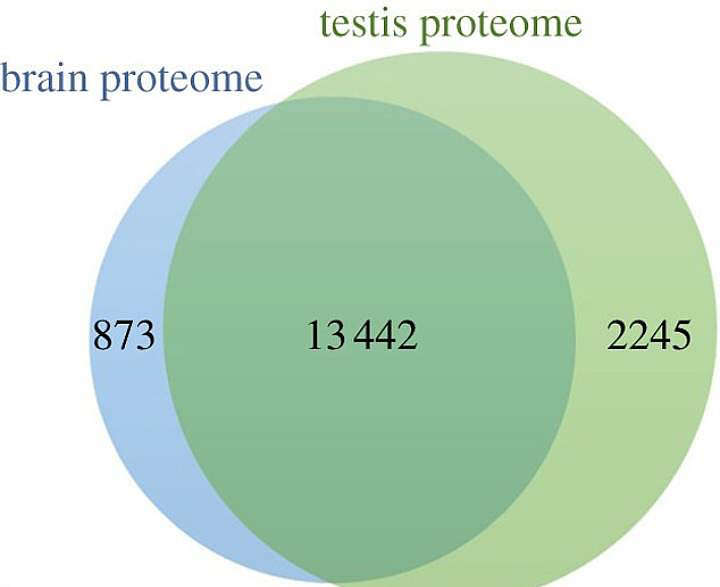
A man's testicles and his brain are made up of the same proteins – well, almost. In the brain there are 14 315 different, in the testes – 15 687. Common, that is, existing here and there, 13 442. Neurons and spermatozoa, which also have many common genes, are also similar in composition.
The similarity is stunning, no other fabric has this.
Another thing is no less surprising: the principles of the brain and testicles are also not very different. The tissues located in the head, and those that are collected just below – in the scrotum, tend to produce special chemicals. Neurons synthesize neurotransmitters, testicular cells – male sex hormones.
Both neurons and testicular cells are involved in the development of tissue structure, exchange information. In the brain, these processes accompany the growth of neuronal processes – axons and dendrites. In the testicles, they cause the sperm to be able to fuse with the egg.

In addition, the tissues of the testicles and the brain are equipped with similar receptors that make the testes sensitive to signals transmitted by neurotransmitters – the same ones that circulate in the brain.
Both structures, by the way, are protected approximately equally from the penetration of foreign substances, the brain – by the blood-brain barrier, the testicles – by the hemato-testicular.
The brain was compared to the testicles by Portuguese scientists from the University of Aveiro (Universidade de Aveiro), having studied 33 types of tissues found in the body. And they themselves were surprised to find such a strange similarity of different, in essence, and purpose, organs. As reported in the Royal Society Open Biology magazine.
The Daily Mail journalists, who briefly talked about the discovery of the Portuguese, could not resist joking right in the headline: “So, do men really think with what they have in their pants? (So men DO think in their pants?). Well, we go there too (see above). Which, in general, is justified. Why not assume that the testes sometimes take over some of the intellectual functions of the brain, since they are so similar. Internally, of course.
It may be that some semblance of thought, but not conscious processes, which nevertheless take place in the testicles, is responsible for some of the oddities in the behavior of men. Namely, an irresistible attraction to some women, pushing to reckless actions in spite of the voice of the “higher reason”. If so it is permissible to call it.

What if victoria or a fiasco in intimate contacts depends on the decisions of the “lower mind”? That is, an erection, sometimes disappearing in the most mysterious way? And with age – with the development of senile dementia.
Why not? After all, scientists at different times found strange coincidences – certain disorders in the activity of the brain arose against the background of cases of sexual dysfunctions.
Another thing is known: that the quality of sperm depends on intelligence. The higher it is, the more active the sperm are, the more there are.
Alas, the Portuguese have not yet delved into these details. And while the phenomenon is explained by the quirks of the so-called convergent evolution – a process as a result of which tissues that develop in similar conditions acquire similar features and similar components – proteins, genes, functions. For some reason, nature performed this trick with the brain and testicles. The mystery of their similarity remains to be revealed.
NOT FOR THE FIRST TIME
Another Thinking Brain Possibly Hidden in Human Stomach
American professor Michael Gershon, head of the department of anatomy at Columbia University in New York (Columbia University), has been arguing for years that people think not only with their heads. Doesn't remember testicles. But he gives convincing evidence of the intelligent activity of the stomachs. The professor even wrote a book called The Second Brain. With the testicles in mind, the book would be called The Third Brain.
The second Gershon calls by no means the spinal cord, which is only a continuation of the brain, but an almost autonomous system located in the intestinal region.
– The nervous network of the stomach does not just execute the commands of the central nervous system, but is capable of making decisions and managing complex processes, – explains the scientist. And he assures that the gastric brain can function even when the brain and spinal cousins are turned off. According to the scientist, such an option of either Mother Nature or the Creator Father “unloaded” the human head, freeing it from the worries associated with digestion.
People, of course, guessed that the head and stomach were somehow connected in a special way. And they noticed that from nervous tension in one place, they begin to “suck” in another. Or even get sick. And with fear sometimes this happens … “Bear disease” is an independent reaction of the stomach, which the brain is unable to resist.
The existence of separate brains explains the strange phenomena in the digestive system. And also difficulties with dieting, when the brain seems to understand – you need to eat less, and the stomach – insistently demands a bun.
The professor became the founder of a new scientific direction called neurogastroenterology, which, in his opinion, will allow the treatment of ulcers, gastritis and other gastric diseases using psychological methods.
By the way, Indian yogis have taught since ancient times: the internal organs of a person, including the stomach, can be persuaded to work effectively and not get sick through thoughts sent from the head.

